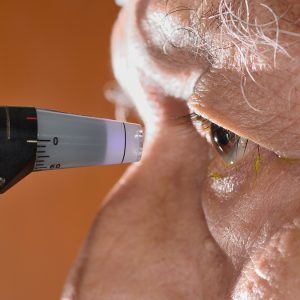Can an optometrist treat glaucoma?
Glaucoma is the leading cause of blindness for people over the age of 60. Glaucoma is a disease that damages the eye’s optic nerve and typically happens due to fluid buildup in the front part of the eye. This fluid increases the pressure in the eye, creating damage to the optic nerve. Here are the causes, symptoms, and treatments for glaucoma.

What causes glaucoma?
Everyone’s eyes have a drainage angle that allows fluid to drain out. If the drainage angle isn’t working properly, fluid starts to build up, and eye pressure rises, then damages the optic nerve.
The optic nerve has more than a million tiny nerve fibers. As these fibers begin to die, you will develop blind spots in your vision. Sometimes, you may not notice the blind spots until most of your nerve fibers have died. If all of the fibers die, you will become blind.
Symptoms of glaucoma
Symptoms of glaucoma vary from patient to patient, depending on what stage your condition is in. However, the most common symptoms are blind spots, blurry vision, and discomfort. Other symptoms can include:
- Severe headaches
- Eye pain
- Nausea and vomiting
- Seeing halos
- Eye redness
- Tunnel vision, which usually shows up in advanced stages
Glaucoma treatment
Optometrists can diagnose and treat many different conditions, including glaucoma. Once you have an appointment, your doctor will conduct a comprehensive eye exam that can include measuring pressure, looking for optic nerve damage, checking for areas of vision loss, and more.
The main focus for treating glaucoma is lowering your eye pressure. Depending on the stage of your condition, your treatment options can include:
- Prescription eyedrops
- Medications
- Laser treatment
- Surgery
- A combination of these
Vision loss from glaucoma cannot be recovered or reversed, so it’s important to have routine eye exams that include measurements of your eye pressure. The earlier a diagnosis is made, the better. Not only will it slow or prevent vision loss, but you can be properly treated.
